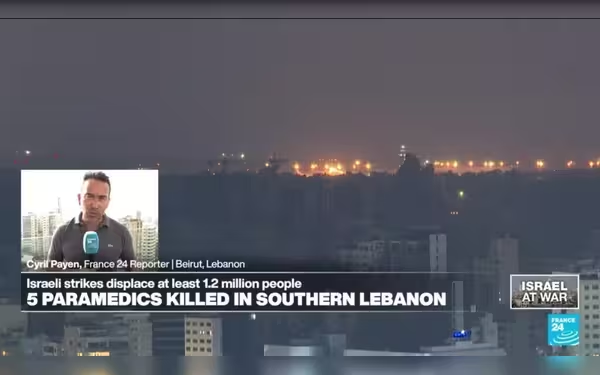Saturday, November 16, 2024 05:55 PM
Israel Launches Major Offensive in Southern Lebanon
- Israel intensifies military operations in southern Lebanon.
- Airstrikes target militant positions amid humanitarian crisis.
- Maritime blockade exacerbates local supply shortages.
 Image Credits: france24
Image Credits: france24Israel escalates military operations in southern Lebanon, intensifying airstrikes and imposing a maritime blockade amid a growing humanitarian crisis.
The ongoing conflict in the Middle East has once again escalated, with Israel launching a significant military offensive in southern Lebanon. This situation has drawn international attention and concern, as the region has been a hotspot for tensions between Israel and various militant groups. The latest developments indicate that the Israeli army is not only conducting ground operations but is also intensifying airstrikes in the area. Furthermore, a maritime blockade has been imposed along the Lebanese coast, further complicating the humanitarian situation.
Reports indicate that the Israeli military is executing multiple ground operations, which are characterized as ‘high intensity’. This means that the operations are not only frequent but also involve heavy firepower and strategic maneuvers aimed at achieving specific military objectives. The airstrikes accompanying these ground operations are designed to target key positions held by militant groups, which Israel views as a threat to its national security.
The maritime blockade adds another layer to the conflict, restricting the movement of goods and people along the coast. This blockade is likely to have severe implications for the local population, who may already be facing shortages of essential supplies. The situation is dire, and the humanitarian impact of these military actions cannot be overstated. Civilians often bear the brunt of such conflicts, and it is crucial for the international community to pay attention to their plight.
As the situation unfolds, it is essential to consider the broader implications of this offensive. The conflict in southern Lebanon is not just a local issue; it has the potential to affect regional stability and international relations. Countries around the world are watching closely, as any escalation could lead to a wider conflict involving multiple nations. It is a reminder of the fragile nature of peace in the region and the urgent need for diplomatic efforts to resolve such disputes.
The current military actions by Israel in southern Lebanon highlight the complexities of the ongoing conflict in the Middle East. While military strategies may aim to neutralize threats, the humanitarian consequences must not be overlooked. It is imperative for all parties involved to seek peaceful resolutions and prioritize the safety and well-being of civilians caught in the crossfire. Only through dialogue and understanding can a lasting peace be achieved in this troubled region.













